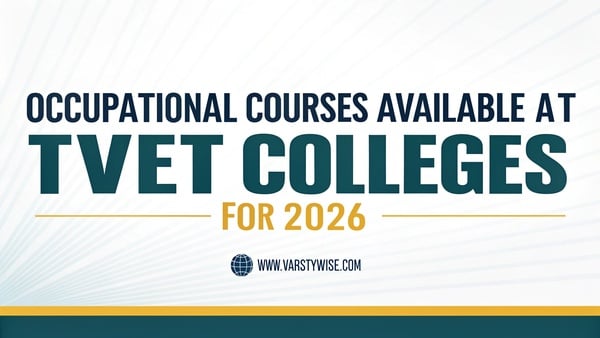
South Africa’s TVET Colleges Open 2026 Applications: Build Career-Ready Skills with Industry-Aligned Courses
As South Africa prepares for the 2026 academic year, Technical and Vocational Education and Training (TVET) colleges are rolling out practical, career-focused programs designed to equip students with skills for a competitive job market. With over 527,000 placements available across 50 public institutions, these colleges play a vital role in addressing skills shortages and driving economic growth.
Why Choose a TVET College?
TVET colleges bridge the gap between education and employment, offering hands-on training in sectors critical to South Africa’s development. From engineering to tourism, their programs are developed in partnership with industry leaders to ensure graduates meet real-world demands. As Minister Buti Manamela emphasizes, these institutions are “engines of industrialization, entrepreneurship, and community development”—not just alternatives to universities.
2026’s High-Demand Occupational Programs
Here are the standout courses available at TVET colleges nationwide:
- Engineering & Technology: Autotronics, Aircraft Maintenance, Welding, Plumbing, and Renewable Energy Systems
- Creative & Service Industries: Hairdressing, Beauty Therapy, Tourism, and Performing Arts
- Construction: Community Housebuilding, Furniture Making, Civil Construction
- IT & Digital Innovation: Computer Technician, Programming, Robotics (e.g., Orbit TVET College’s ICT specializations)
- Business Development: Sports Administration, Early Childhood Development
All programs follow the National Qualifications Framework (NQF) and are accredited by the Quality Council for Trades and Occupations (QCTO), guaranteeing alignment with industry standards.
How TVET Colleges Prepare You for Success
Leading institutions like Tshwane South TVET College and False Bay College combine classroom learning with workplace experience:
- Industry partnerships: Regular curriculum updates based on employer feedback
- Digital readiness: E-learning platforms and 4IR-focused courses in AI, robotics, and automation
- Practical training: Workshops mirroring real work environments (e.g., automotive repair labs, construction sites)
How to Apply for 2026 Programs
Key dates & requirements:
- Applications now open at all 50 public TVET colleges
- Deadlines vary by institution—check college websites
- Basic requirements: Grade 9 certificate (NQF 1) or Grade 12 (NQF 4)
Application steps:
- Submit online via college portal (e.g., Tshwane South’s application system)
- Upload ID, academic records, and proof of address
- Awrite placement tests if required for your program
Financial Support Options
Multiple funding avenues make TVET education accessible:
- NSFAS bursaries: Covers tuition, books, and accommodation
- SETAs learnerships: Paid workplace training in sectors like construction and IT
- College-specific aid: Contact financial aid offices for local opportunities
Your Path to Employment Starts Here
TVET graduates consistently outperform national employment statistics. Recent DHET data shows 65% of TVET alumni secure jobs within six months of completing NQF Level 4 programs. Popular career paths include:
- Certified automotive technicians (R180,000–R350,000 annual salary)
- Construction site supervisors (R220,000–R480,000)
- Tourism service managers (R150,000–R300,000)
Pro Tip: Many colleges like Northlink and False Bay offer job placement services through their industry networks.
Take Action Now
Visit your preferred college’s website to explore full course lists and start your application. Key institutions to consider:
- Tshwane South TVET College (engineering/business leaders)
- False Bay College (pioneers in e-learning)
- Orbit TVET College (tech innovation specialists)
With 2026 enrollment now open, secure your future in South Africa’s growing economy through skills that matter. Your career transformation begins at a TVET college.
Was this helpful?
20 / 2
#Administration #Bursaries #Education #Engineering #Learnerships #Learning